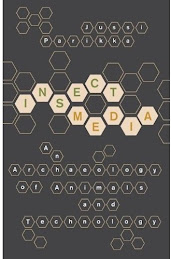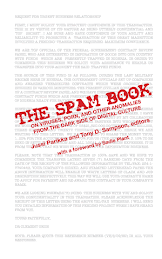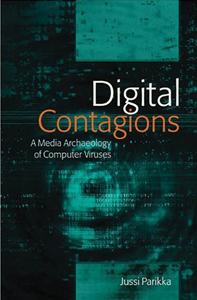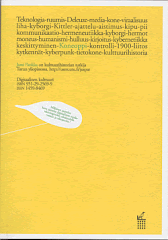Digital culture is one of “nondescript animals”, or if one wants to be a bit less poetic, “nondescript objects.” Originally, “nondescripts” were such animals that fell outside the analytical labeling system in the seventeenth and eighteenth century. Later, as Michelle Henning points out in her Museums, Media and Cultural Theory, such anomalies were “apt rather to appeal to casual curiosity-seekers”.
As a category of anomality, such nondescripts are what puzzle and do not fit in. They are in tension between cognitive and affective categories, borrowing elements from what seems too many directions. They are not neat, nice and they do not make sense. We have headaches because of them, and I am not just talking about academics or businessmen trying to figure out best ways to extract value of such weird objects of for example p-2-p-culture.
This is why such objects of digital culture are often seen as “hybrids” or for example mixings of cultural and computational (Manovich). Nondescripts are more than just objects, as they are processual foldings of so many scales and layers that their ontological status remains puzzling. This applies to their status as objects as much as to the workflows and routines in settings where digital objects are created and passed on; design studios, game companies, service operators, etc.
The emergence of the new research institute CoDE – the Cultures of the Digital Economy is for me a vehicle to reach such nondescripts of which our contemporary culture is constituted. I was appointed as its Director starting January 1st, 2010, and in that role I see myself as a cartographer of nondescripts.
The nondescripts are everywhere. Value creation and business models are filled with such weird objects that copyright law and such are trying to pin down often with archaic models. Cultural interaction turns puzzling with communities, communication, and even modes of emotional engagement from friendship (think of Facebook) to sex being mediated through software platforms. Cultural memory does not escape nondescripts either, with materiality of the objects being embedded in new forms of social media, distributed archives and heterogeneous access methodologies. Its no wonder we see a continuous emergence of neologisms that try to grab the complexity of such trends; media ecologies, media archaeologies, and such, all trying to flag the multiplicity of ties both horizontally and temporally.
In terms of CoDE’s remit, there are various directions we could go. In addition to several essential ones, the institute is a good way to take into account:
- - transdisciplinarity. To excavate such research themes but also knowledge transfer contacts that fall outside the disciplinary boundaries. Not just between disciplines, but in-between as a space of nondescripts. The UK has a great history of art and science collaboration (think of for example the Cybernetic Serendipity exhibition at the London ICA curated by Jasia Reichardt and in general the history of British cybernetics).
- - Software objects and studies. As part of the possible future(s) of media studies, software studies is in a crucial relay position to tie together a variety of ways of tackling with the ontology of where we are now. Software, automated cultural processes, new ways of creation of visual and sonic content, programmability, articulation of politics in and through software embedded contexts, etc. is the stuff of “cultural” studies – or should we say “not-just-cultural-studies.” Just like good media theory is always “not-just-media-theory”, any engagement with contemporary culture realizes the extent to which it is articulated through software.
- - Old/new/dead media. We should not let the newness of digital culture fool us. It is new as a temporal phenomena, whereas too often the newness of new media has been non-temporal, almost like a void. Old media is going nowhere, and new media is the one that takes care of that – paradoxically. The short term innovations are embedded in the longue durée of history of uses and ideas – what media archaeologists have referred to as the history of recurring topoi (Huhtamo) and deep time history (Zielinski.) This is where digital culture and economy are not only about the digital; but about media culture as a beehive of innovation of ways of seeing, hearing, feeling and where “old media” is a continuous archive for such ideas.
- - Creative practice and theory intertwinings. CoDE needs to extend research from pure theory/written research into a variety of other modalities in terms of optical, sonic and other media modes of creation. Research-creation. Here again the reaching out to what the 1990s called “creative industries” and what is rebranded as part of “digital economy” (even if also the government seems to be really uncertain what this means) is an essential component of academic collaboration. The Cambridge area of technology and related industries that are strong e.g. in entertainment (thinking of games here) is still a buzzing arena for collaboration.
This is where I see “nondescripts” also as passages and vehicles that transport research outside the academia as well. They are transversal in the sense Félix Guattari talked about transversal relations that are able to cut across normalized hierarchical organizational relations. Institutions and institutes do not necessarily have to solidify, but can be based on principles of circulation, mobility and a sense of vitality that does not lack in criticality either.
To conclude, a short insert on the emerging research streams of CoDE:
The Cultures of Digital Economy (CoDE) Institute embeds research streams in artistic and cultural approaches to digital technologies. It emphasises cultures in the plural, and uses creative practice as the motor for value creation in digital environments. Its research projects, business and community engagement and learning collaborations emphasise this innovative, critical, and creative approach to the digital economy. The research is by nature transdisciplinary –between and across disciplinary boundaries – and probes new opportunities to cultivate innovative approaches to new information, media, and communication content, platforms, and networks.
CoDE has four key Research Streams:
1. Social media and Network Politics
The ubiquity of networking, social media and web 2.0 in everyday life means new positives and pitfalls in building social relationships, value creation, and knowledge production, and in highlighting politics and activism. CoDE is dedicated to analysing emerging forms of peer-to-peer activity, social collaboration, and remix culture through a combination of established and experimental research methods.
2. Digital Performance and Production
With the establishment of Anglia Ruskin’s Digital Performance Lab and a strong cluster of research productive staff, CoDE will develop and grow innovative research in music and embodied performance in digital environments. From creative practice research to the development of new interfaces and applications for music production this stream thrives on rapid changes to sonic economies and creative communities fostered by digital interfaces, immersive environments, and wearable technologies.
3. Digital Humanities – Archives, Interfaces, Tools
Rethinking humanities in the age of new media is a crucial and unavoidable challenge for academics worldwide. From new theoretical approaches to innovative modes of distribution, archiving, and accessing of material, CoDE research projects tackle complex questions posed by efforts to digitize forms of cultural heritage, intellectual archives, and humanities-based forms of critical and creative work.
4. Play and Serious Gaming
Digital culture is by its nature playful. Gaming does not only represent a mode of entertainment and a new form of interactivity that gives rise to new practical and theoretical tools, but also a way of rethinking learning and education. Including everything from visual effects to serious gaming, this research stream brings together SMEs, informal programming communities, interface developers and designers. It will create new opportunities for Cambridge’s existing and emerging strengths in the gaming industry to collaborate and will explore the future that these technologies hold.
Code is Directed by Dr Jussi Parikka, Reader in Media Theory & History at Anglia Ruskin,
Co-Director: Dr Samantha Rayner
Research Fellow: Dr Greg Elmer
CoDE has over 50 affiliated staff members from across a range of disciplines: from computing to media theory, creative music technologies to creative visual practices and much more.










